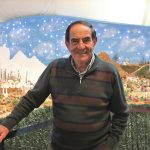Deolinda Rodrigues (1924–2015) may not be a name that we are familiar with in the English-speaking community, but the late resident of Portimão once graced the stage and screen as one of Portugal’s greatest fado singers and actresses.
My introduction to this story happened quite by accident. I was sitting in my friend’s living room in Portimão when I noticed a picture on the wall. I enquired who the elegant woman was. “That’s my grandmother, Deolinda Rodrigues, the fado singer. This was once her apartment,” Jorge replied. And so with intrigue, I delved into the life story of one of Portugal’s long-forgotten heroes of the iconic sound of fado and Portuguese film.
This month, on 31 December, Deolinda would have celebrated her 99th birthday, although it is said she preferred to celebrate her birthday on 1 January. Born in 1924 in the former Convent of Telheiras in Lisbon, she became fascinated by the art of fado at a young age. Jorge told me that one of her first debuts was in a competition organised by the Portuguese newspaper Diário Popular, where she won second place. Over time, Deolinda Rodrigues slowly made a name for herself, performing in shows across the country and even entertaining the soldiers in the Portuguese colonies during the Colonial War.



By 1944, she had made a professional appearance at the Parque Mayer entertainment complex in Lisbon before going on to perform in some of the best fado cabaret bars in the city, such as Café Mondego, Retiro dos Marialvas and Café Latino. One could say that these venues were Portugal’s answer to the famous cabaret circuit of Paris, often the start of many entertainers’ careers and a city in which Deolinda sang on numerous occasions.
Encouraged by the singer José António, Deolinda proposed a collaboration of ideas for the national broadcaster, which eventually led to the Deolinda Rodrigues weekly radio show. In 1947, she appeared on the front cover of the Canção do Sul newspaper under the title Fado’s Harmony Flower.
The newspaper reported that, “Those who like fado know that Deolinda sings it as it should be sung, with feeling, melody and expression. In the soul of this girl, modest and unpretentious, the fadista ballad is a simple flower defoliating in petals of poetry.” (16 March 1947, p.3).



Among a host of films and operettas, Jorge told me that “one of her most famous appearances was in Henrique Campos’ 1950 film Cantiga da Rua and the 1952 film Madragoa by Perdigão Queiroga”. She toured across Portugal and overseas, entertaining in Mozambique, Angola, Venezuela, South Africa, Brazil, the United States and Canada, singing some of the best-known pieces of fado in her harmonic voice. Throughout her long and successful career, Deolinda performed alongside some of Portugal’s most well-known artists such as Hermínia Silva and Álvaro Pereira and many international stars of that era.
After her marriage and the birth of her daughter Maria in the 50s, Deolinda took a short two-year break from the world of show business, living in Angola to raise her family. Upon returning to Portugal, she would rekindle her passion for the arts, yet again appearing in cinemas, TV programmes and on radio in addition to her beloved live tours, which had taken her far and wide.


In 1986, Deolinda starred in the national television production Um Solar Alfacinha, later followed by an appearance in the soap opera Vidas de Sal, which aired in 1996. She became a firm favourite on the 2004 television program Portugal no Coração, making many guest appearances, sharing stories about her life and, without hesitation, singing some of the songs which led her to stardom.
In October 2004, the Lisbon Municipality Association honoured Deolinda Rodrigues for her 60 years in show business. This was followed by Lisbon City Council’s Municipal Medal of Merit in 2007, which stated that Deolinda Rodrigues was an “unavoidable name in national song in the first half of the 20th century”.


Still in demand, Deolinda often appeared on TV talk shows, one filmed in her own living room in Lisbon behind the same backdrop of photos that now hang on Jorge’s apartment walls. After joining her family in Portimão later in life and living in the city centre, Deolinda eventually moved to Casa do Artista in Lisbon, a home for convalescing entertainers. On 10 October 2015, Deolinda Rodrigues passed away at the age of 90 at the Santa Maria Hospital in Lisbon.

Sitting in the same living room that Deolinda once graced, surrounded by her awards and posters, I asked Jorge how he would describe his grandmother. He paused, looked up and said, “She was a strong-minded woman who fought for her dreams, she remained strong right up until the end. Above all, she was a loving family woman who showed warmth and compassion to everyone.”
Images: from the booklet “Homage to Deolinda Rodrigues” and personal family photos, courtesy of the family of Deolinda Rodrigues.
Interview on Channel RTP (Archive) 1991
RTP Channel Archive of Fadista Deolinda Rodrigues 1965













